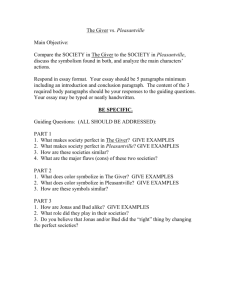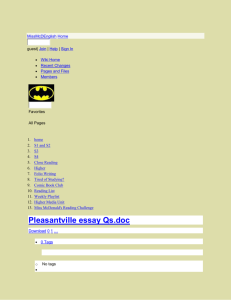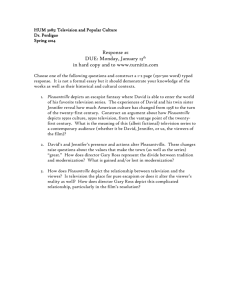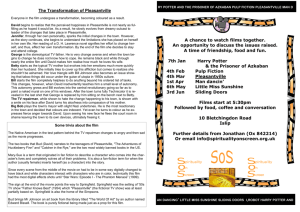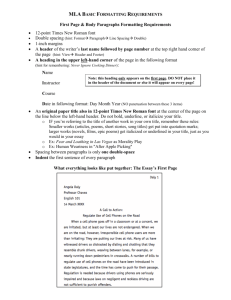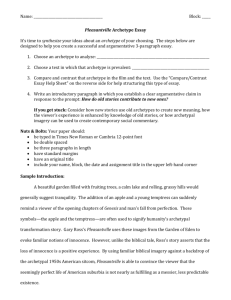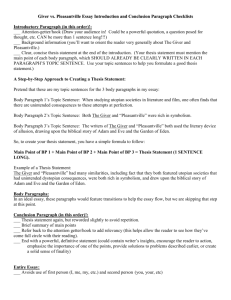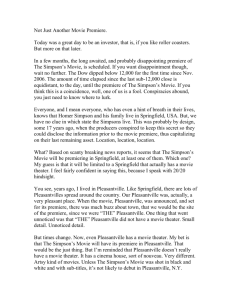Pleasantville paper samantha
advertisement
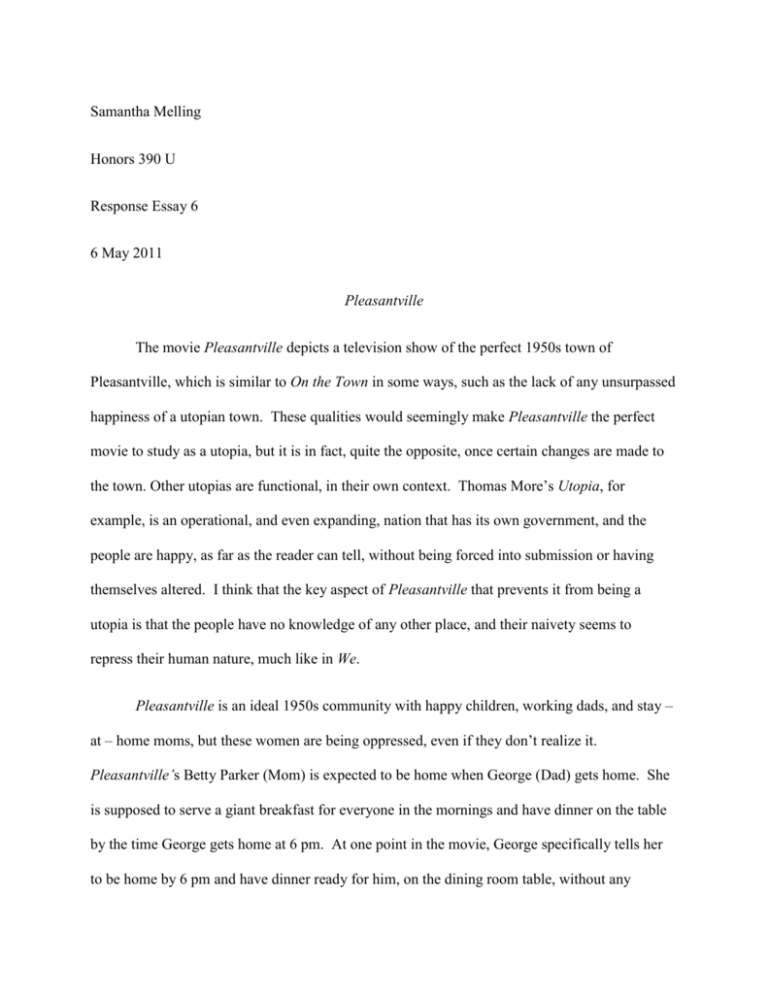
Samantha Melling Honors 390 U Response Essay 6 6 May 2011 Pleasantville The movie Pleasantville depicts a television show of the perfect 1950s town of Pleasantville, which is similar to On the Town in some ways, such as the lack of any unsurpassed happiness of a utopian town. These qualities would seemingly make Pleasantville the perfect movie to study as a utopia, but it is in fact, quite the opposite, once certain changes are made to the town. Other utopias are functional, in their own context. Thomas More’s Utopia, for example, is an operational, and even expanding, nation that has its own government, and the people are happy, as far as the reader can tell, without being forced into submission or having themselves altered. I think that the key aspect of Pleasantville that prevents it from being a utopia is that the people have no knowledge of any other place, and their naivety seems to repress their human nature, much like in We. Pleasantville is an ideal 1950s community with happy children, working dads, and stay – at – home moms, but these women are being oppressed, even if they don’t realize it. Pleasantville’s Betty Parker (Mom) is expected to be home when George (Dad) gets home. She is supposed to serve a giant breakfast for everyone in the mornings and have dinner on the table by the time George gets home at 6 pm. At one point in the movie, George specifically tells her to be home by 6 pm and have dinner ready for him, on the dining room table, without any exceptions or excuses. Betty doesn’t realize that this is oppression because it is considered acceptable in her town, and every woman in the town is treated this way. A lack of knowledge of the wrong that is being done doesn’t justify the fact that it is happening. This scenario of the women in Pleasantville is very reminisce of how the handmaids were treated in the Handmaid’s Tale. The handmaids were always considered inferior to the Wives, the men of the community, and the Aunts. The sole purpose of the handmaids was to reproduce, much like the purpose of the women in Pleasantville was to cook, clean, and raise the children. Oppressing women, or people in general, is inappropriate, and not a humane way to treat our fellow humans. Betty realizes that this treatment is unacceptable, which is apparent when she kisses the soda shop manager, and after this she decides to stand up to, and leave, her husband and his oppression, resulting in the first broken family in Pleasantville. Human nature is naturally good, curious, and anxious to learn, change, and grow. This seems to have become a major point of discussion this semester in our course, and I think that it is rightly so, because without a discussion on human nature, it is nearly impossible to decide what is actually perfection and what is just forced happiness. In Yevgeny Zamyatin’s We, the characters were suppressed throughout the entire novel, and some citizens even had their imaginations removed which is similar to the removal of change in Pleasantville, such as when This is just one of the many things that makes We a dystopia, and I think it is a major aspect in dystopian literature. In Pleasantville, human nature is repressed in several different ways: the natural instinct to learn is denied, curiosity is shunned, and change is prohibited. Art is completely forbidden, as well as new styles of music, simply because it represents change, and change, although an essential part of human nature, is not acceptable. People believe that others have a certain freedom, and when those freedoms are taken away, people generally don’t think that it is acceptable. If something is unacceptable, it is then generally considered a bad thing, and bad things are not parts of a utopia. Suppressing either humans or human nature, is not an acceptable thing, making Pleasantville a dystopia, although Pleasantville goes a bit further, making it an anti-utopian society. The people of Pleasantville have no idea that they are so uninformed, which is most likely due to the fact that the citizens are part of a television show. They have no knowledge of any wrongs they are suffering or of anything that they are lacking. The citizens are always peaceful and uniform in their routines and nothing ever changes. Their routines are so set that if one thing does manage to change, their lives cease to function properly. They are naïve and seriously lacking knowledge. Curiosity is a key component to human nature that doesn’t seem possible to repress in this movie, which comes into play when this repression of their human nature slowly starts to get lifted. At one point in the movie, this lifting of their repression can be seen when the rain starts and color replaces nearly all the black and white. The naivety of the Pleasantville community is so extreme that it makes it anti-utopic. If the people had knowledge of things outside of their town and still chose to live the way they do, it would be the ultimate utopian community, but in a way, they are forced to live these sheltered lives. Their perfection is pushed to the extreme, and the true, anti-utopian society is revealed when the people are finally free to live their own lives by their own choices. The line between utopian and anti-utopian is a very faint one that is easily distinguished when people are given the choice to live with their own decisions and have their own human nature free from suppression.
